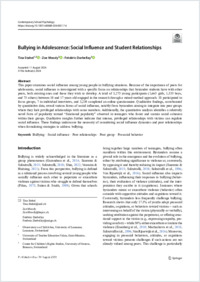Bullying in Adolescence: Social Influence and Student Relationships
Education, enfance et société apprenante 21
- Stahel, Tina ORCID Observatory on Child Abus, University of Lausanne,Lausanne, Switzerland
- Moody, Zoe ORCID HEP-VS
- Darbellay, Frédéric ORCID Centre for Children’s Rights Studies, University of Geneva,Bramois, Switzerland
- 2024
Published in:
- Contemporary School Psychology. - 2024
English
This paper examines social influence among young people in bullying situations. Because of the importance of peers for adolescents, social influence is investigated with a specific focus on relationships that bystander students have with other peers, both existing ones and those they wish to develop. A total of 3,275 young participants (1,665 girls, 1,535 boys, and 75 others) between 10 and 17 years old engaged in the research through a mixed-method approach: 38 participated in focus groups, 7 in individual interviews, and 3,230 completed an online questionnaire. Qualitative findings, corroborated by quantitative data, reveal various forms of social influence, notably from bystanders aiming to integrate into peer groups where they lack privileged relationships with some members. Additionally, the quantitative analysis identifies a relatively novel form of popularity termed “functional popularity” observed in teenagers who foster and sustain social cohesion within their groups. Qualitative insights further indicate that intense, privileged relationships with victims can regulate social influence. These findings underscore the necessity of considering social influence dynamics and peer relationships when formulating strategies to address bullying.
- Language
-
- English
- License
- Open access status
- hybrid
- Identifiers
- Persistent URL
- https://fredi.hepvs.ch/hepvs/documents/329193
Statistics
Document views: 152
File downloads:
- Stahel_et_al-2024-Contemporary_School_Psychology: 213
